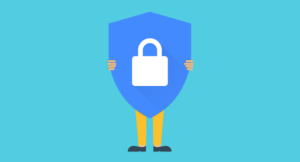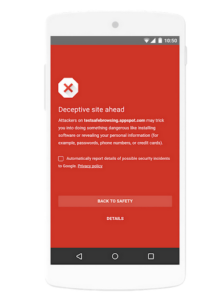We know that people are shopping from home more these days, and with the holiday season upon us, we can expect that number to increase. In fact, 72% of Holiday shoppers say they will shop more online this season. Ahead of this busy time, we wanted to share some tips to help you stay safe as you shop online.
#1 Protect your online shopping accounts

Most of us create multiple accounts when accessing e-commerce platforms to purchase items, and these accounts often contain sensitive information, like your contact details and credit card information.
Make sure you choose a strong, unique password that’s at least eight characters long, and use a different password for every account, so that if one account is hacked, your other accounts aren’t compromised.
And should you ever get logged out of your account and need to quickly regain access, adding recovery information like a phone number or email address will definitely be helpful!
#2 Download secure apps

The festive season brings brisk business for e-commerce sites who might prompt you to download their dedicated shopping app for a better shopping experience. Just be aware of any fake shopping apps that set out to steal your personal information.
To prevent that, make sure you’re downloading apps from trusted sources like the Google Play Store which scans all apps for malware before and after you install them.
#3 Beware of phishing when surfing online

Phishing cases are on the rise and spotting them can be a challenge, even for savvy web users. It is important to learn how to spot suspicious emails and websites, preventing yourself from revealing critical personal information such as your password.
To avoid being a victim of phishing attacks:
- Never click on questionable links
- Always double-check the URL to make sure the browser shows a lock symbol to ensure that you’re entering your data into a legitimate website
- Before submitting any information, make sure that the site’s URL begins with ‘https’ (versus “http”), meaning it’s secure
Use web browsers which have security steps in place to keep users away from phishing sites. For example, if you visit a site with malware or attempts to phish you, you’ll be warned by Chrome and taken back to safety. Or if you type your Google account password into a suspected phishing site, Chrome will surface a warning and add protections to ensure your account isn’t compromised.
Take this quiz to test your phishing-detection skills!
#4 Beware of offers that sound too good to be true

Online marketplaces are a great place to get the best bargains for the festive season. But do think twice about that great bargain you’ve spotted, especially if it sounds too good to be true.
To prevent yourself from falling victim to an e-commerce scam, here are some easy steps to follow:
- Always check the seller’s score and track record, and only purchase from reputable sellers
- Use shopping platforms that release payments to the seller after you have received the goods
- With millions of buyers online selling products, you can look to secure sites via the Google Shopping Tab to surface merchants who meet a minimum review score so you’ll know they’re safe.




